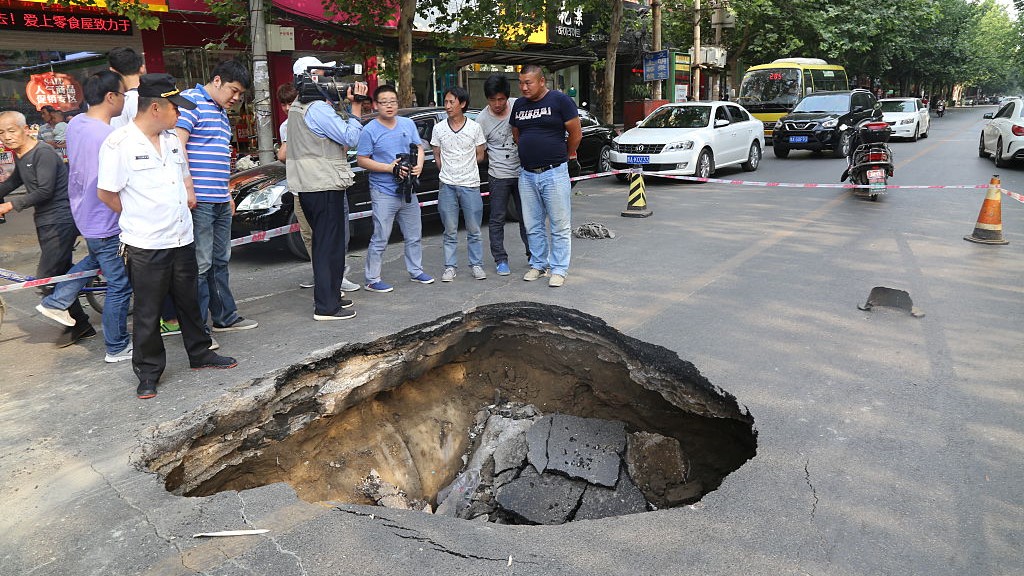Nearly half of China’s major cities are sinking due to groundwater extraction and the sheer weight of urban buildings and infrastructure, a new study finds.
The affected cities, which include Beijing and Tianjin, are concentrated in the eastern part of the country and along the coast. Combined with sea level rise, falling cities could expose around 10% of China’s coastal population — between 55 and 128 million people — to flooding and irreparable damage by 2120.
For the study, published Thursday (April 18) in the journal Science, researchers measured land subsidence in every Chinese city with a population of more than 2 million people over the period from 2015 to 2022. Of the 82 cities they examined, 45% are sinking by more than 0.1 inches (3 millimeters) per year, with 16% falling by more than 0.4 inches (10 mm) per year.
These major cities are home to three-quarters of China’s urban population, which totaled 920 million people in 2020 — the largest of any country in the world, according to the study.
“The subsidence appears to be associated with a range of factors such as groundwater withdrawal and the weight of buildings,” the researchers wrote in the study. “High-rise buildings are sprouting up, road systems are expanding, and groundwater is being used, all at a rapid pace.”
While it was already known that Chinese cities are subsiding, the study provides a first snapshot of the problem on a national scale. The researchers used data from the Sentinel-1 satellites, which measure vertical changes in Earth’s surface with Interferometric Synthetic Aperture Radar (InSAR) instrumentation, and combined these land motion results with groundwater assessments from monitoring wells and building weight data.
“In addition to the national pattern of city subsidence, we identified several natural and human factors that were associated with city subsidence,” the team wrote in the study. Natural factors included the geological setting of each city and the depth of the bedrock, which influenced the amount of weight the ground could hold up without sinking.

Citizens look a deep hole in the road caused by subsidence in Zhengzhou, in China’s Henan province. (Image credit: Getty Images)
The researchers found a strong link between sinking cities and groundwater loss, which leaves empty pore space in the crust that becomes compacted as weight piles on above. “Most of the groundwater changes were anthropogenic,” the researchers wrote, with natural rainfall patterns making up for just 12% of the variation.
Groundwater extraction is causing cities to sink worldwide, including on the U.S. East Coast.
Other factors contributing to subsidence were urban transportation networks — with trains adding to the weight and producing vibrations — as well as hydrocarbon extraction and mining, which both create empty pockets in the ground that eventually collapse and compact.
But “the key to addressing China’s city subsidence could lie in the long-term, sustained control of groundwater extraction,” the researchers emphasized.

Residents look at buildings that have subsided and leaned in Guilin, in China’s Guangxi Province. (Image credit: Getty Images)
Subsidence threatens infrastructure and people by destabilizing and fissuring the ground, and by increasing the risk of floods, according to the study. Sinking cities on China’s east coast could soon drop below sea level, with up to 26% of the country projected to deflate below that threshold in the next 100 years. Currently, around 6% of Chinese land sits below sea level.
“Subsidence jeopardizes the structural integrity of buildings and critical infrastructure and exacerbates the impacts of climate change in terms of flooding, particularly in coastal cities where it reinforces sea-level rise,” Robert Nicholls, a professor of climate adaptation at the University of East Anglia in the U.K., who was not involved in the research, said in a statement.
Nicholls agreed with the study authors that slowing groundwater extraction could stave off subsidence, as it has previously done in Tokyo. “Tokyo subsided around the port area, up to five meters [16.4 feet] in the 20th century,” Nicholls said. In the 1970s, authorities “provided good piped water from other areas and they also had a law saying ‘you will not use well water’ and essentially it stopped the subsidence.”
News Related-
Up to 40 Tory MPs ‘set to rebel’ if Sunak’s Rwanda plan doesn’t override ECHR
-
Country diary: A tale of three churches
-
Sunak woos business elite with royal welcome – but they seek certainty
-
Neil Robertson shocked by bad results but has a plan to turn things round
-
Tottenham interested in move to sign “fearless” £20m defender in January
-
Bill payers to stump up cost of £100m water usage campaign
-
Soccer-Venue renamed 'Christine Sinclair Place' for Canada soccer great's final game
-
Phil Taylor makes his pick for 2024 World Darts Championship winner
-
Soccer-Howe aims to boost Newcastle's momentum in PSG clash
-
Hamilton heads for hibernation with a word of warning
-
Carolina Panthers fire head coach Frank Reich after 1-10 start to the season
-
This exercise is critical for golfers. 4 tips to doing it right
-
One in three households with children 'will struggle to afford Christmas'
-
Biden apologised to Palestinian-Americans for questioning Gaza death toll, says report
